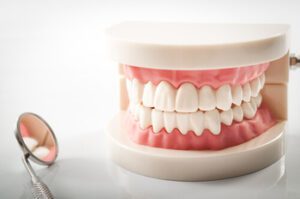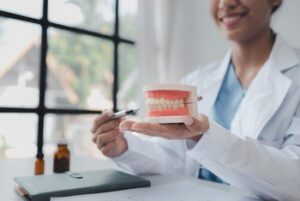If you’ve ever thought, “Why is my mouth dry even though I drink a lot of water?”, you’re not alone. It’s a surprisingly common complaint that leaves many people confused. You might be drinking plenty, yet your mouth still feels sticky, parched, or even burning. This condition is referred to as dry mouth, also known as xerostomia, and simply drinking water isn’t always enough to fix it.
In this blog, we’ll unpack the reasons behind chronic dry mouth, including why hydration doesn’t always solve the issue, the hidden role of your salivary glands, and what you can do to increase saliva flow and maintain good oral hygiene. We’ll also cover dry mouth symptoms, causes, and the best dry mouth remedies backed by dental advice.
Understanding Dry Mouth: It’s Not Just About Water
Dry mouth occurs when your salivary glands don’t produce enough saliva to keep your mouth moist. Saliva isn’t just water. It’s a complex fluid that contains enzymes, antibodies, and electrolytes. It helps you chew food, swallow, speak, and digest. It also plays a major role in protecting your oral health, washing away bacteria and neutralising acids.
So, even if you’re drinking plenty of water, a reduced saliva flow will still leave your mouth feeling dry. Water hydrates your body, but saliva is what actually keeps your mouth moist.
Common Symptoms of Dry Mouth
You may not realise that what you’re experiencing is part of a broader problem. Here are the most frequent symptoms of dry mouth:
 A persistent dry feeling in the mouth or throat
A persistent dry feeling in the mouth or throat- Cracked lips or corners of the mouth
- Burning sensation on the tongue or inner cheeks
- Bad breath
- Rough tongue texture
- Difficulty swallowing food
- Hoarseness or dry throat
- Problems speaking clearly
- Increased need to sip water during meals
- Frequent mouth infections or mouth sores
- Trouble wearing dentures
If these sound familiar, you may be dealing with more than simple dehydration.
Why Your Mouth Feels Dry Even If You Drink Water
There are many causes of dry mouth, and several don’t involve your water intake at all. Let’s explore the most common ones:
1. Certain Medications
One of the biggest risk factors for dry mouth is medication. More than 500 drugs can cause dry mouth, including those used for:
- High blood pressure
- Allergies (antihistamines)
- Depression or anxiety
- Pain relief
- Muscle relaxants
- Decongestants for a blocked nose
Even over-the-counter medications can lead to reduced saliva flow. If you’re taking multiple drugs (especially as you age), the side effects can compound.
2. Medical Conditions
Several underlying health conditions can interfere with saliva production, including:
- Diabetes
- Sjogren’s syndrome
- HIV/AIDS
- Parkinson’s disease
- Stroke
- Cystic fibrosis
These conditions either affect the glands directly or interfere with the nerve signals that stimulate saliva production.
3. Radiation Therapy and Chemotherapy
Patients undergoing radiation therapy for head and neck cancers often experience dry mouth due to damage to their salivary glands. Similarly, some medical treatments like chemotherapy alter the consistency and amount of saliva produced.
4. Nerve Damage
Nerves play a big role in controlling saliva flow. Injuries or surgery to the head and neck area can lead to a chronic dry mouth if the nerves regulating your glands are damaged.
5. Mouth Breathing and Snoring
If you breathe through your mouth while sleeping or have sleep apnoea, you’re likely to wake up with a dry mouth. This is especially common in people with a blocked nose or who sleep in dry environments.
6. Lifestyle Habits
Some habits and substances can contribute to dry mouth symptoms, such as:
- Smoking or chewing tobacco
- Drinking alcohol
- Consuming spicy or salty foods
- Excessive caffeine intake
- Skipping meals (less chewing means less saliva)
The Role of Saliva in Oral Health
 Saliva is much more than just moisture. Here’s what it does:
Saliva is much more than just moisture. Here’s what it does:
- Helps prevent tooth decay and gum disease
- Neutralises acids in the mouth
- Aids digestion
- Prevents mouth infections
- Makes it easier to chew food and swallow
- Keeps the mouth moist and speech clear
When saliva flow drops, these systems break down. That’s why dry mouth can lead to oral infections, cavities, cracked lips, and more.
Is It Possible to Have Dry Mouth Even With Normal Hydration?
Absolutely. If your salivary glands aren’t functioning correctly, drinking water won’t fully solve the problem. Hydration is important, but it won’t replace the protective enzymes, proteins, and buffers in saliva.
How Much Saliva Should You Produce?
A healthy person produces between 0.5 and 1.5 litres of saliva per day. That may sound like a lot, but it’s distributed throughout the day and serves many roles.
If you’re producing significantly less due to nerve damage, medications, or illness, your mouth may feel dry even if you’re sipping water frequently.
Dry Mouth Relief: What You Can Do at Home
Now that we understand why it happens, let’s talk about dry mouth treatment and what actually helps.
1. Chew Sugar Free Gum
Chewing sugar-free gum is one of the best ways to stimulate saliva production. The act of chewing encourages your glands to work, and the sugar-free formula won’t damage your teeth.
Look for gum with xylitol, which also fights cavity-causing bacteria.
2. Use Saliva Substitutes
Artificial saliva products can be found at most chemists. These saliva substitutes help mimic real saliva and are useful for managing chronic dry mouth, especially in those with permanent gland damage.
3. Suck on Ice Cubes or Sugar-Free Lozenges
Ice cubes can provide temporary relief by moisturising the mouth and reducing the burning sensation. Likewise, sugar-free lozenges can help increase saliva flow and soothe dry throat symptoms.
4. Improve Your Environment
Try using a humidifier in your bedroom at night. This helps prevent dry mouth sensations caused by dry air and mouth breathing while you sleep.
5. Practise Good Oral Hygiene
Brush your teeth two times per day using fluoride toothpaste, clean between your teeth each day, and schedule routine dental check-ups. People with dry mouth are more prone to tooth decay and gum disease, so proactive care is crucial.
6. Avoid Spicy or Salty Foods
Salty foods and spicy dishes can irritate already dry or sensitive tissue. Opt for softer, milder foods when your mouth feels dry.
7. Stay Away from Alcohol-Based Mouthwash
Some mouth rinses contain alcohol, which dries the mouth further. Choose alcohol-free, dry mouth-friendly options designed to increase saliva production instead.
8. Apply Lip Balm Frequently
Cracked lips are a classic sign of dry mouth. Use lip balm during the day, especially in cold or dry weather, to prevent splitting and discomfort.
When to See a Dentist
If your dry mouth continues even after trying these remedies, it may be time to investigate deeper medical conditions or medical treatments. Make an appointment if you notice:
- Ongoing difficulty eating, chewing, or swallowing
- A burning sensation that worsens
- Development of mouth sores or frequent mouth infections
- Difficulty wearing dentures
- Sudden onset of dry mouth after a new medication
- Dry throat that interferes with speaking
A dentist may suggest further testing to assess your salivary gland function or discuss changes to your current treatment plan.
Lifestyle Triggers That Worsen Dry Mouth
Even if you’re drinking plenty of water, certain habits and exposures can keep your mouth dry, or even make symptoms worse. Let’s look at common risk factors and lifestyle habits that may be contributing to the issue.
1. Mouth Breathing and Blocked Noses
One of the most overlooked causes of dry mouth is breathing through the mouth rather than using the nose to breathe. If you have a blocked nose, a deviated septum, or chronic sinus issues, your body may naturally switch to mouth breathing, especially during sleep.
This not only dries out the oral tissues but also increases the evaporation of saliva, reducing the protective barrier that keeps your mouth moist. Over time, this can lead to cracked lips, a rough tongue, and even mouth sores.
Snoring and sleep apnoea are also linked to a dry throat and morning mouth dryness. If you notice symptoms of dry mouth primarily after sleeping, consider whether mouth breathing might be a factor.
2. Spicy or Salty Foods
Another underestimated trigger is your diet. Spicy or salty foods may irritate the inner cheeks and gums, and when saliva flow is already reduced, the discomfort can intensify.
These foods don’t necessarily cause dry mouth, but they can worsen the burning sensation and dry feeling many people with chronic dry mouth experience. Try reducing your intake temporarily to see if your symptoms improve.
3. Chewing Tobacco and Caffeine
Chewing tobacco and excessive caffeine consumption are known to cause dry mouth by interfering with saliva production. While quitting smoking is beneficial for your overall oral health, cutting back on caffeine may also help, especially if you drink coffee or energy drinks throughout the day.
Remember: saliva helps neutralise acids, wash away bacteria, and protect teeth. Any lifestyle habit that interferes with its function can leave you vulnerable to tooth decay, gum disease, and even mouth infections.
4. Dehydrating Medications and Medical Treatments
As mentioned earlier, certain medications can reduce saliva flow, but it’s not just antihistamines or antidepressants. Chemotherapy, radiation therapy to the neck and head area, and other medical treatments can significantly lower how much saliva your body produces.
Radiation, in particular, may damage the salivary glands permanently. If you’ve undergone treatment for head and neck cancer, dry mouth may be one of your long-term side effects, and managing it requires ongoing care and the use of saliva substitutes.
Not Enough Saliva = Bigger Oral Health Risks
 When your mouth doesn’t produce enough saliva, your risk of fungal infection, mouth infections, and bad breath increases. Tooth decay and gum disease also become more likely because your mouth isn’t washing away food debris and bacteria as it should.
When your mouth doesn’t produce enough saliva, your risk of fungal infection, mouth infections, and bad breath increases. Tooth decay and gum disease also become more likely because your mouth isn’t washing away food debris and bacteria as it should.
You might also find that chewing food or swallowing food becomes harder, which can lead to difficulty eating and even weight loss in some cases.
Regardless of the cause, good oral hygiene remains essential. Brushing, flossing, and routine check-ups can all help protect against the knock-on effects of reduced saliva flow.
Summary: Why Your Mouth Might Still Be Dry
So, the answer to the core question, “Why is my mouth dry even though I drink a lot of water?” is that your saliva production isn’t keeping up.
Drinking water keeps your body hydrated, but it can’t restore the saliva produced by healthy glands. If your salivary glands are impaired due to medication, health issues, or lifestyle factors, the result is often a dry feeling that water alone can’t resolve.
Final Thoughts
Living with a dry mouth can be more than just uncomfortable. It can impact your speech, confidence, and oral health. But the good news is that dry mouth treatment options exist, and many are simple, accessible, and effective.
Whether it’s using a saliva substitute, chewing sugar-free gum, adjusting your medication, or improving your oral care routine, you don’t have to live with that parched feeling forever.
If you’re concerned about chronic dry mouth or want expert guidance on how to support saliva production and protect your oral health, book a consultation with us at Definitive Dental or call (02) 6105 9833
Resources
Brennan, R. (2023). ‘What to Know About Tooth Decay Stages’. WebMD, 6 September. New York, NY: WebMD LLC. https://www.webmd.com/oral-health/what-to-know-tooth-decay-stages
Cleveland Clinic (2022). ‘Oral Hygiene’. Cleveland Clinic, 21 April. Cleveland, OH: Cleveland Clinic. https://my.clevelandclinic.org/health/treatments/16914-oral-hygiene
Mayo Clinic Staff (2023). ‘Dry Mouth’. Mayo Clinic, 19 December. Rochester, MN: Mayo Foundation for Medical Education and Research. https://www.mayoclinic.org/diseases-conditions/dry-mouth/symptoms-causes/syc-20356048
Kubala, J. (2023). ‘Soft Food Diet: Foods to Eat and Foods to Avoid’. Healthline, 15 March. San Francisco, CA: Healthline Media. https://www.healthline.com/nutrition/soft-food-diet

